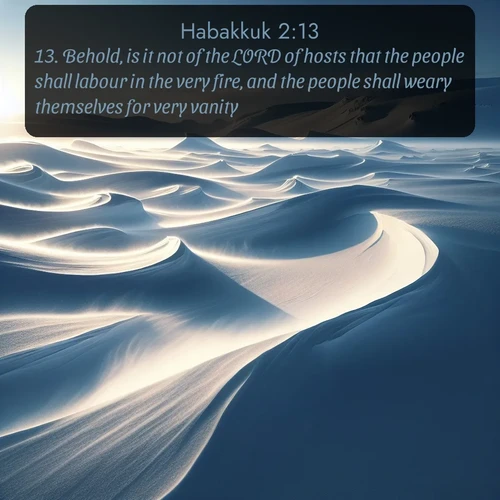Habakkuk 2:13 plusieurs versions / traductions
English Bible Translations
13. Behold, is it not of the LORD of hosts that the people shall labour in the very fire, and the people shall weary themselves for very vanity?
13. Behold, is it not of Jehovah of hosts that the peoples labor for the fire, and the nations weary themselves for vanity?
13. See, is it not the pleasure of the Lord of armies that the peoples are working for the fire and using themselves up for nothing?
13. Behold, is it not of Jehovah of hosts that the peoples labour for the fire, and the nations weary themselves in vain?
13. Behold, is it not from the LORD of hosts that the people shall labor in the very fire, and the people shall weary themselves for very vanity?
13. Lo, is it not from Jehovah of Hosts And peoples are fatigued for fire, And nations for vanity are weary?
German Bible Translations
13. Wird's nicht also vom HERRN Zebaoth geschehen: was die Völker gearbeitet haben, muß mit Feuer verbrennen, und daran die Leute müde geworden sind, das muß verloren sein?
13. Siehe, kommt es nicht vom HERRN der Heerscharen, daß Völker fürs Feuer arbeiten und Nationen für nichts sich abmühen?
French Bible Translations
13. Cela ne vient-il pas de l'Eternel, le maître de l'univers? *Des peuples travaillent pour du feu, des nations s'épuisent pour du vide.
13. Voici, quand l’Eternel des armées l’a résolu, Les peuples travaillent pour le feu, Les nations se fatiguent en vain.
13. Voici, quand l'Eternel des armées l'a résolu, Les peuples travaillent pour le feu, Les nations se fatiguent en vain.
13. Voici, n'est-ce pas de par l'Éternel des armées que les peuples travaillent pour le feu, et que les peuplades se lassent pour néant?
13. Voici, n'[est]-ce pas de par l'Eternel des armées que les peuples travaillent pour en nourrir abondamment le feu, et que les nations se fatiguent très inutilement?
13. Voici, n'est-ce pas par la volonté de l'Éternel des armées que les peuples travaillent pour le feu, et que les nations se lassent pour le néant?
Versions with Strong Codes
Habakkuk 2 / KJV_Strong13.
Strong Code definitions
H2009 hinneh hin-nay' prolongation for H2005; lo!:--behold, lo, see. see H2005
H3808 lo' lo or lowi {lo}; or loh (Deut. 3:11) {lo}; a primitive particle; not (the simple or abs. negation); by implication, no; often used with other particles (as follows):--X before, + or else, ere, + except, ig(-norant), much, less, nay, neither, never, no((-ne), -r, (-thing)), (X as though...,(can-), for) not (out of), of nought, otherwise, out of, + surely, + as truly as, + of a truth, + verily, for want, + whether, without.
H4480 min min or minniy {min-nee'}; or minney (constructive plural){min-nay'}; (Isaiah 30:11); for H4482; properly, a part of; hence (prepositionally), from or out of in many senses (as follows):--above, after, among, at, because of, by (reason of), from (among), in, X neither, X nor, (out) of, over, since, X then, through, X whether, with.see H4482
H854 'eth ayth probably from H579; properly, nearness (used only as a preposition or an adverb), near; hence, generally, with, by, at, among, etc.:--against, among, before, by, for, from,in(-to), (out) of, with. Often with another prepositional prefix.see H579
H3068 Yhovah yeh-ho-vaw' from H1961; (the) self-Existent or Eternal; Jehovah, Jewish national name of God:--Jehovah, the Lord. Compare 3050, 3069. see H3050 see H3069
H6635 tsaba' tsaw-baw' or (feminine) tsbadah {tseb-aw-aw'}; from H6633; a mass of persons (or figuratively, things), especially reg. organized for war (an army); by implication, a campaign, literally or figuratively (specifically, hardship, worship):--appointed time, (+) army, (+) battle, company, host, service, soldiers, waiting upon, war(-fare).see H6633
H5971 `am am from H6004; a people (as a congregated unit); specifically, a tribe (as those of Israel); hence (collectively) troops or attendants; figuratively, a flock:--folk, men, nation, people.see H6004
H3021 yaga` yaw-gah' a primitive root; properly, to gasp; hence, to be exhausted, to tire, to toil:--faint, (make to) labour, (be) weary.
H1767 day dahee of uncertain derivation; enough (as noun or adverb), used chiefly with preposition in phrases:--able, according to, after (ability), among, as (oft as), (more than) enough, from, in, since, (much as is) sufficient(-ly), too much, very, when.
H784 'esh aysh a primitive word; fire (literally or figuratively):-- burning, fiery, fire, flaming, hot.
H3816 lom leh-ome' or l owm {leh-ome'}; from an unused root meaning to gather; a community:--nation, people.
H3286 ya`aph yaw-af' a primitive root; to tire (as if from wearisome flight):--faint, cause to fly, (be) weary (self).
H1767 day dahee of uncertain derivation; enough (as noun or adverb), used chiefly with preposition in phrases:--able, according to, after (ability), among, as (oft as), (more than) enough, from, in, since, (much as is) sufficient(-ly), too much, very, when.
H7385 riyq reek from H7324; emptiness; figuratively, a worthless thing; adverbially, in vain:--empty, to no purpose, (in) vain (thing), vanity.see H7324
Prédications qui analysent les thèmes Habacuc 2
Thèmes : La plainte de Habacuc; Réponse de Dieu; La promesse de jugementHabaquq 2 et 3 – Malgré les apparences, Dieu est juste
Habaquq 1 et 2 – Prière sans réponse !
Related Sermons discussing Habakkuk 2
Themes : La plainte de Habacuc; Réponse de Dieu; La promesse de jugementsee also: Bible Key Verses ; KJV Bible Images, BBE Bible images

